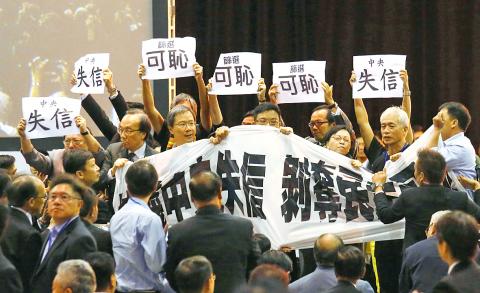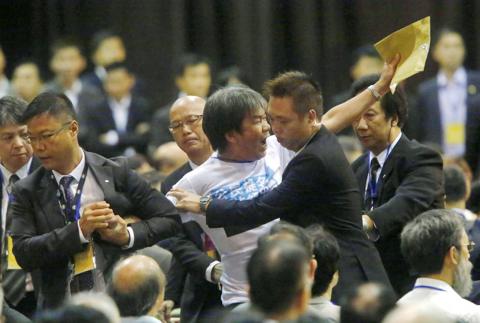Hong Kong pro-democracy activists yesterday heckled a top Chinese official, setting the stage for disruptive protests against the mainland’s landmark decision to limit voting reforms, but Beijing insisted that there would be no turning back.
Li Fei (李飛), deputy secretary-general of the Standing Committee of China’s National People’s Congress (NPC), was forced to speak over the cries of pro-democracy lawmakers and protesters during a meeting with local officials in the territory.
Brief scuffles erupted outside the venue as police used pepper spray to stop protesters from storming the hall, where Li told delegates that China would not tolerate a local leader who is disloyal to the mainland.

Photo: Reuters
“Anyone who does not love the country, love Hong Kong or is confrontational towards the central government shall not be the chief executive,” he said.
His visit came a day after democracy activists vowed an “era of civil disobedience,” including mass sit-ins at the territory’s financial district in response to Beijing’s decision to grant only limited reforms in the former British colony.
Democrat lawmakers said they would sink Beijing’s proposal when it comes before the territory’s Legislative Council early next year.

Photo: Reuters
“If it’s the same proposal decided by the NPC, we will vote against it,” Hong Kong Legislator Frederick Fung (馮檢基) said, adding that at least 25 of his colleagues have signed a declaration to shoot it down.
The proposal needs to win two-thirds support — or 47 votes — in the 70-seat legislature to pass.
For years, activists have agitated for the right to nominate candidates and to vote for Hong Kong’s leader, a campaign buoyed by a recent surge in discontent over rising inequality and perceived interference by Beijing. However, their hopes were dashed on Sunday.
The NPC Standing Committee announced that residents will be allowed to elect their next leader in 2017 — but candidates must be chosen by a pro-Beijing committee and must win the backing of more than half of the committee members to stand. Only two or three will be allowed to contest the election.
Democracy activists have called the restrictive framework a betrayal of Beijing’s promise to award Hong Kong universal suffrage by 2017 and say the nominating committee would ensure a sympathetic slate of candidates and exclude dissidents.
As Li approached the lectern to speak at the Asia World Expo convention center, veteran dissident Legislator Leung Kwok-hung (梁國雄) started shouting him down, his fist raised in the air. He was joined by a dozen pro-democracy lawmakers and some younger demonstrators who unfurled a banner and chanted: “The central government broke its promise, shameless.”
The meeting was briefly suspended while security officers removed the hecklers, to loud cheers and applause from pro-Beijing lawmakers.
Police confirmed they used pepper spray outside the venue when “protesters behaved violently.”
During an afternoon press conference Li criticized the pan-
democrats for heckling him.
“The door for dialogue has always been open, but this morning, it was they [the pan-democrats] who refused to communicate,” he said.
Li flew to Hong Kong from Beijing late on Sunday and was forced to drive past a crowd of largely student protesters gathered outside his hotel, in the kind of scenes that would be unthinkable on the mainland.
Following China’s decision to vet candidates, the pro-democracy group Occupy Central said on Sunday it would go ahead with its threat to take over the Central financial district in protest, at an unspecified date.
Shortly before Li’s speech activists launched what they described as a “slow drive” through the territory, the first of a string of promised small-scale civil disobedience acts.
About 10 cars, decked with flags, made their way deliberately slowly through the territory, accompanied by police motorcycles, but traffic was not noticeably disrupted.

AGING: As of last month, people aged 65 or older accounted for 20.06 percent of the total population and the number of couples who got married fell by 18,685 from 2024 Taiwan has surpassed South Korea as the country least willing to have children, with an annual crude birthrate of 4.62 per 1,000 people, Ministry of the Interior data showed yesterday. The nation was previously ranked the second-lowest country in terms of total fertility rate, or the average number of children a woman has in her lifetime. However, South Korea’s fertility rate began to recover from 2023, with total fertility rate rising from 0.72 and estimated to reach 0.82 to 0.85 by last year, and the crude birthrate projected at 6.7 per 1,000 people. Japan’s crude birthrate was projected to fall below six,

Conflict with Taiwan could leave China with “massive economic disruption, catastrophic military losses, significant social unrest, and devastating sanctions,” a US think tank said in a report released on Monday. The German Marshall Fund released a report titled If China Attacks Taiwan: The Consequences for China of “Minor Conflict” and “Major War” Scenarios. The report details the “massive” economic, military, social and international costs to China in the event of a minor conflict or major war with Taiwan, estimating that the Chinese People’s Liberation Army (PLA) could sustain losses of more than half of its active-duty ground forces, including 100,000 troops. Understanding Chinese

US President Donald Trump in an interview with the New York Times published on Thursday said that “it’s up to” Chinese President Xi Jinping (習近平) what China does on Taiwan, but that he would be “very unhappy” with a change in the “status quo.” “He [Xi] considers it to be a part of China, and that’s up to him what he’s going to be doing, but I’ve expressed to him that I would be very unhappy if he did that, and I don’t think he’ll do that. I hope he doesn’t do that,” Trump said. Trump made the comments in the context

SELF-DEFENSE: Tokyo has accelerated its spending goal and its defense minister said the nation needs to discuss whether it should develop nuclear-powered submarines China is ramping up objections to what it sees as Japan’s desire to acquire nuclear weapons, despite Tokyo’s longstanding renunciation of such arms, deepening another fissure in the two neighbors’ increasingly tense ties. In what appears to be a concerted effort, China’s foreign and defense ministries issued statements on Thursday condemning alleged remilitarism efforts by Tokyo. The remarks came as two of the country’s top think tanks jointly issued a 29-page report framing actions by “right-wing forces” in Japan as posing a “serious threat” to world peace. While that report did not define “right-wing forces,” the Chinese Ministry of Foreign Affairs was